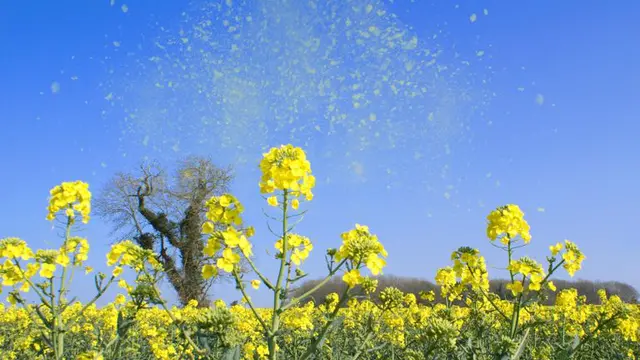As pollen levels pick up in the UK, some people could start finding it difficult to tell whether they are suffering from hay fever or coronavirus.
They may be concerned they have an overlap in symptoms, and GPs have offered advice on how to distinguish between the two.
The chair of the Royal College of GPs, Professor Martin Marshall, said: "We would normally expect to see a number of patients at this time of year suffering with symptoms of allergic rhinitis, more commonly known as hay fever - an allergic reaction to various types of pollen.

Applause as patient discharged from NHS Nightingale
"Typically, patients suffering with hay fever will experience symptoms such as a runny or blocked nose, sneezing, sore and watering eyes - but also sometimes a cough.
"Some of these presenting problems, especially a cough, can also be symptoms of
COVID-19
."
The main symptoms of coronavirus are a new, persistent dry cough and a fever, and it can develop into respiratory problems.
Sufferers are advised to self-isolate for 14 days if they, or anyone else in their household, begins to show symptoms.
However, Professor Marshall said there were some key differences when it came to telling the two illnesses apart.
"Allergy symptoms tend to be milder and fluctuate depending on the time of day as pollen levels are often higher in the afternoon and evening," he explained.

Minister: No date for when schools might re-open
"Similarly, wet weather may lead to patients experiencing milder symptoms.
"Patients who regularly suffer from hay fever will be familiar with the symptoms they usually get and the severity of them.
"In instances where a patient experiences a significant deviation from this, or have specific symptoms of COVID-19 - a new, persistent cough and a high temperature - we urge them to follow government advice and self-isolate."
Guidance for allergy sufferers on the website of charity Allergy UK says: "Coronavirus symptoms typically include a continuous cough and a temperature as well as sometimes causing headaches and muscle aches. These are not symptoms of hay fever.
"Hay fever symptoms are persistent and relatively predictable depending on the pollen count.
"Symptoms of runny, itchy nose and sneezing which are typical of hayfever are not typical of coronavirus.
**:: Listen to Coronavirus: In This Together on **
Apple Podcasts
**, Spotify
, or Spreaker
**
"Hay fever should respond to antihistamines and, if you have been prescribed them, nasal sprays.
"We would recommend that you treat hay fever proactively to minimise your symptoms, reducing the tendency for you to touch your face due to itch, and prevent unintentional spread of coronavirus by sneezing."
Grass and tree pollen are the most common causes when it comes to hay fever, with the season typically lasting from May until September.
 简体中文
简体中文

